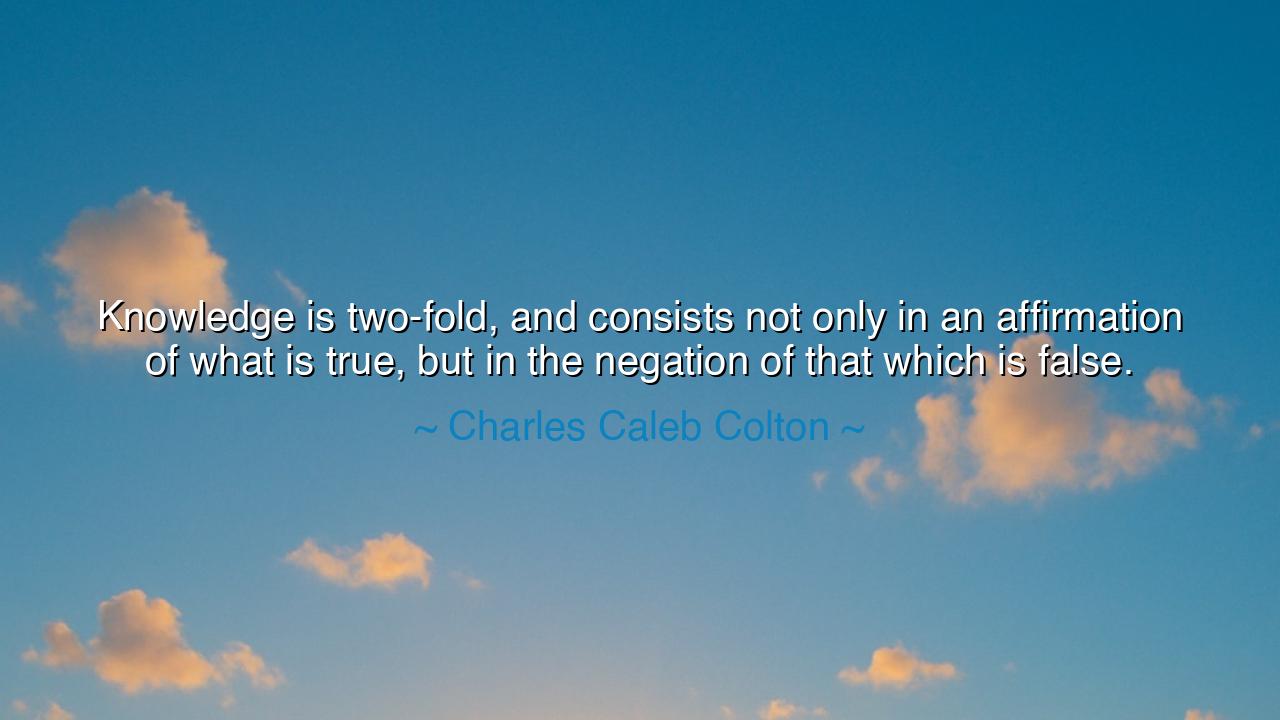
Knowledge is two-fold, and consists not only in an affirmation of
Knowledge is two-fold, and consists not only in an affirmation of what is true, but in the negation of that which is false.






The words of Charles Caleb Colton — “Knowledge is two-fold, and consists not only in an affirmation of what is true, but in the negation of that which is false” — shine with the timeless clarity of a philosopher who understood that wisdom is not born from acceptance alone, but from discernment. Colton, a nineteenth-century clergyman and essayist known for his work Lacon, lived in an age of rapid progress — when science, theology, and reason wrestled for mastery. His insight speaks across centuries: true knowledge does not consist merely in gathering facts, but in purifying them, in separating truth from illusion. For to see rightly, one must first learn what not to see.
The ancients taught this truth long before Colton gave it voice. The Delphic Oracle urged, “Know thyself,” but implicit in that command was its shadow: to know oneself is also to recognize what one is not. In this same spirit, Colton’s teaching reminds us that affirmation and negation are twin pillars of understanding. The seeker of wisdom must build upon truth, but he must also tear down falsehood. A man who accepts everything as truth becomes enslaved by error; a man who rejects everything remains ignorant. The harmony of knowledge lies in balance — in the courage to believe rightly, and the courage to doubt boldly.
Consider the story of Galileo Galilei, who lived centuries before Colton, yet embodied his philosophy in deed. Galileo’s greatness lay not only in affirming that the Earth moves around the Sun, but in denying the long-accepted falsehood that the heavens revolved around man. His triumph was two-fold: a declaration of truth and a rejection of illusion. It was this act of negation — the refusal to bow before error sanctified by tradition — that gave humanity a new vision of the cosmos. Thus, Galileo became not merely a scientist, but a symbol of the intellectual courage Colton celebrates: the courage to question, to refuse the comfortable lie in pursuit of the uncomfortable truth.
In every field — science, art, morality, and faith — this principle remains eternal. A painter must know what not to paint; a leader must know which voices to ignore; a believer must distinguish between sacred truth and superstition. Colton’s insight reveals that knowledge is not a static possession but a dynamic process, one that refines itself through doubt and discovery. The ignorant man fills his mind with many things; the wise man clears away the unnecessary until only truth remains. Like a sculptor who reveals the statue by removing the excess stone, the true seeker reveals understanding by the act of removing falsehood.
There is deep spiritual power in this discipline. The soul that does not learn to reject falsehood becomes burdened by confusion. Every age has its glittering illusions — false prophets, seductive lies, and comforting deceptions. To follow Colton’s wisdom is to become a guardian of one’s own mind, to test every belief with reason and conscience. It is an act of moral strength to say, “This I will not accept, for it does not bear the mark of truth.” Such discernment is not cynicism; it is faith refined by thought, reason illuminated by spirit.
History is filled with those who have failed because they affirmed without negating. Whole empires have collapsed under the weight of dogmas they refused to question. The Roman Church’s persecution of free thought, the tyranny of unexamined ideologies in the twentieth century — all stand as monuments to what happens when affirmation is not balanced by doubt. The greatest teachers — from Socrates to Confucius, from Aquinas to Einstein — all understood that to find truth, one must first learn the sacred art of disagreement with falsehood.
The lesson of Colton’s words, then, is clear and enduring: to be wise is to discern. Let every man and woman cultivate not only the hunger for truth, but the discipline to reject deceit. Read widely, but question deeply. Believe passionately, but test every belief by the light of conscience and reason. For wisdom does not grow from abundance of information, but from purity of understanding.
Therefore, let us teach the generations to come that knowledge is twofold — that truth must be sought and error must be cast away. Let them learn to affirm what is noble, good, and enduring, but also to deny what is hollow, harmful, and false. For only when both are done — affirmation and negation, light and shadow, truth and discernment — can the human spirit stand in full understanding. Then, and only then, shall we be free, not just to know, but to know rightly.






AAdministratorAdministrator
Welcome, honored guests. Please leave a comment, we will respond soon